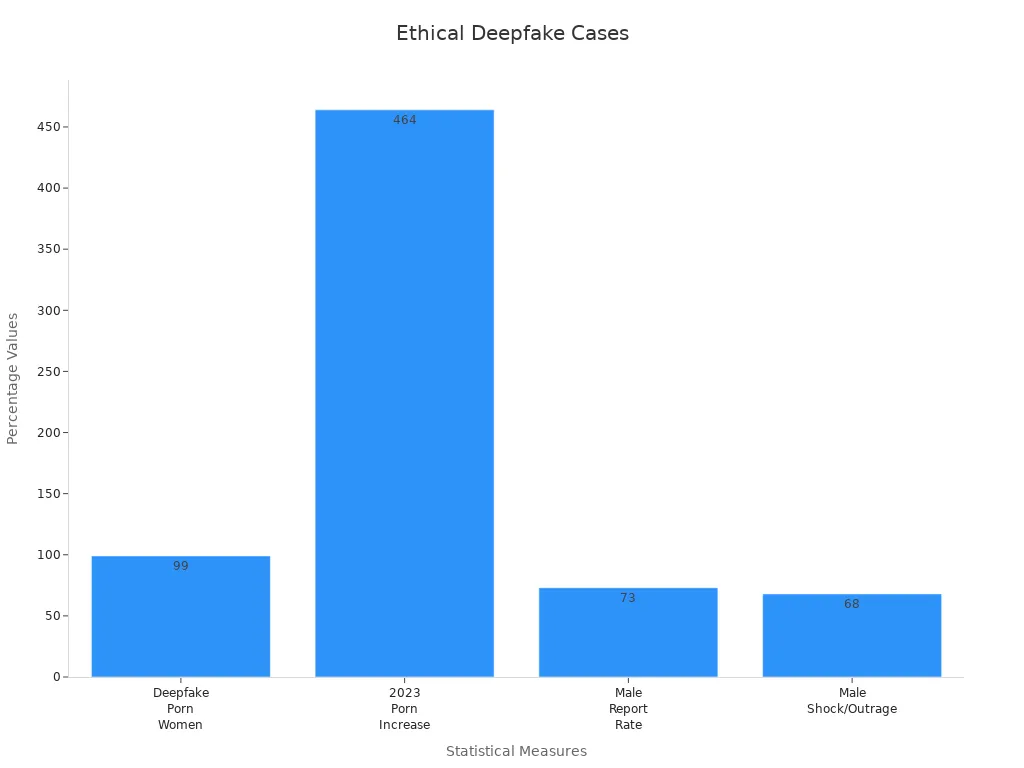TikTok AI Porn Ethics: Can We Draw the Line?
TikTok AI porn raises ethical concerns about non-consensual deepfakes. Explore the technology, societal impacts, and legal challenges in 2025.


You’ve likely seen how technology evolves faster than society can adapt. In 2025, TikTok AI porn highlights this gap. AI advancements allow the creation of hyper-realistic deepfakes, with 96% of these being pornographic. Most target women without consent, raising urgent ethical concerns. This misuse of technology forces you to question where the line between innovation and exploitation lies. The ethics of such content go beyond privacy violations. It challenges the moral responsibility of platforms like TikTok in protecting users from harm.
Understanding TikTok AI Porn
What is TikTok AI Porn?
TikTok AI porn refers to the use of artificial intelligence to create deepfakes that mimic real people in pornographic scenarios. These deepfakes often involve non-consensual sexual deepfakes, where individuals' likenesses are used without their permission. You might wonder how this is possible. AI technology has advanced to the point where it can generate hyper-realistic images and videos, making it difficult to distinguish between real and fake content. This raises significant ethical concerns, as it blurs the line between reality and fabrication, leading to potential abuse and exploitation.
How TikTok Contributes to AI Porn
You may have noticed TikTok's efforts to combat the spread of deepfake porn on its platform. TikTok has actively removed advertisements for AI kissing apps that use deepfake technology to create synthetic videos. This action highlights TikTok's commitment to user protection and consent. Unlike other platforms, TikTok takes a proactive approach to managing AI-generated intimate content. This contrasts with platforms like Meta, which have allowed such content to proliferate. TikTok's stance demonstrates a significant difference in how platforms handle the propagation of deepfakes and underscores the importance of ethical responsibility in digital spaces.
Advances in AI Technology in 2025
By 2025, AI technology has reached unprecedented levels of sophistication. You might find it astonishing how AI can now create deepfakes with remarkable accuracy. These advancements have made it easier to produce deepfake porn, posing new challenges for society. The technology behind deepfakes has become more accessible, allowing even those with minimal technical skills to create convincing fake videos. This ease of access increases the risk of abuse, as more individuals can exploit this technology for unethical purposes. As AI continues to evolve, it becomes crucial to address the ethical implications and establish clear guidelines to prevent misuse.
Note: The rapid development of AI technology necessitates ongoing discussions about ethics and the responsibilities of platforms like TikTok in safeguarding users from harm.
Ethical Dilemmas of Non-Consensual Sexual Deepfakes

Consent and Exploitation Issues
You might think consent is a straightforward concept, but deepfakes complicate it. Non-consensual sexual deepfakes exploit individuals by using their likeness without permission. A study by Sensity AI revealed that 96% of deepfakes are non-consensual sexual deepfakes, with 99% of these targeting women. This misuse of deepfake technology creates manipulated pornographic videos that violate personal boundaries and dignity. Victims often experience emotional distress, as their images are turned into fake nude images or deepfake porn without their knowledge.
The ethical concerns surrounding consent go beyond individual harm. Deepfake images and videos are increasingly used in cases of intimate partner violence and domestic violence. Abusers weaponize this technology to threaten and control victims, amplifying the impact of technology-facilitated abuse. You might wonder why this happens. The accessibility of AI tools makes it easier for perpetrators to create and distribute such content, leaving victims with little recourse.
Societal Impacts of AI Porn
The societal impact of deepfake porn extends far beyond individual victims. Exposure to pornography, especially manipulated content like deepfakes, can lead to behavioral changes and mental health issues. Research shows that early exposure to pornography correlates with increased depression and anxiety, particularly in adolescents. Individuals exposed to deepfake porn often struggle with social integration and commitment to family and school.
Problematic sexualized behaviors (PBS) linked to deepfake exposure can disrupt interpersonal relationships and impulse control. Emotional disturbances caused by deepfake pornography affect how people perceive sexuality and interact socially. Adolescents, in particular, face challenges in forming healthy romantic relationships due to distorted views of intimacy.

Ethical Responsibility of Platforms
Platforms like TikTok play a crucial role in addressing the ethical implications of deepfakes. You’ve seen TikTok take steps to remove AI-generated intimate content, but ethical standards demand more. Platforms must prioritize accountability by implementing stricter policies to prevent the spread of non-consensual sexual deepfakes.
TikTok’s proactive approach contrasts with other platforms that allow deepfake porn to proliferate. Ethical concerns arise when platforms fail to act, enabling abuse and exploitation. By establishing clear ethical standards, platforms can protect users and reduce the harm caused by deepfake technology. Collaboration with governments, AI developers, and advocacy groups can help create a safer digital environment.
Note: Ethical responsibility isn’t just about removing harmful content. It’s about fostering a culture of accountability and ensuring victims of domestic abuse and other forms of exploitation receive the support they need.
Legal Challenges of TikTok AI Porn in 2025
Gaps in Current Laws
You might find it surprising how current laws struggle to keep up with the rapid evolution of deepfake technology. The anonymity associated with deepfakes complicates the prosecution of offenders. Victims often lack legal protections to maintain their anonymity, leading to under-reporting. This situation highlights a significant gap in the legal framework, failing to protect victims adequately and support prosecution efforts. Moreover, there's a notable difference in the speed of content removal. Reports under the DMCA result in removal within a day, while those under privacy policies take over three weeks. This disparity illustrates a gap in the effectiveness of legal versus platform-based responses to non-consensual intimate media.
Accountability for Non-Consensual Sexual Deepfakes
Accountability remains a pressing issue in the realm of non-consensual sexual deepfakes. Victims of deepfake porn often resort to copyright law to reclaim their likenesses. An investigation revealed over 13,000 copyright claims filed by victims, encompassing nearly 30,000 URLs. These claims target various websites known for distributing non-consensual, digitally-altered videos. This reliance on copyright law underscores the urgent need for lawmakers to address the unique challenges posed by deepfakes. The current legal system struggles to hold offenders accountable, leaving victims without adequate recourse.
Proposals for Future Legal Frameworks
To address these challenges, you might consider the urgent need for lawmakers to develop comprehensive legal frameworks. These frameworks should focus on protecting victims of domestic abuse and image-based sexual abuse. Lawmakers must prioritize creating laws that specifically address the ethical concerns and impact of deepfakes. Collaboration between governments, platforms like TikTok, and advocacy groups can help establish clear guidelines. By doing so, society can better protect individuals from the misuse of deepfake technology and ensure accountability for those who exploit it.
Drawing the Line: Ethical and Legal Solutions
Establishing Ethical Guidelines
You might wonder how society can address the ethical challenges posed by deepfakes. Establishing clear ethical guidelines is a crucial first step. These guidelines should focus on protecting individuals from the misuse of deepfake technology while promoting accountability among platforms. Transparency plays a vital role here. Social media platforms must conduct internal audits and share reports on their content moderation activities. This ensures they remain accountable for their actions and helps identify areas for improvement.
Legal requirements for disclosure should also be enforced by dedicated regulatory agencies. These agencies can ensure that platforms implement transparency measures effectively, rather than treating them as mere formalities. By prioritizing ethics in digital content regulation, society can create a safer online environment for everyone.
Collaboration Between Key Stakeholders
Collaboration among key stakeholders is essential to combat the abuse of deepfake technology. You might find it interesting that organizations like the Partnership on AI (PAI) have already taken steps to address these issues. For example:
- Stakeholder groups have proposed educational initiatives to address specific concerns about AI.
- Political groups have collaborated to explore AI-related challenges and mobilize action.
- Public engagement campaigns have raised awareness about AI threats, drawing lessons from successful advocacy efforts.
Additionally, stakeholders like the Center for Democracy & Technology (CDT) and Digital Action have shared insights to enhance understanding of AI regulations. These collaborative efforts demonstrate the power of collective action in tackling the ethical dilemmas posed by deepfakes.
Raising Awareness and Educating the Public
Education is a powerful tool in addressing the societal impacts of deepfakes. You can help by raising awareness about the dangers of deepfake pornography and its links to domestic violence. Public campaigns should focus on teaching individuals how to identify manipulated videos and images. This knowledge empowers people to recognize and report harmful content.
Access to data for researchers is another critical aspect. Independent evaluations of platform performance can uncover issues that companies might overlook. By supporting transparency and education, society can foster a culture of accountability and ethics in the digital age.
Tip: Encourage open discussions about the ethics of AI and the risks of deepfake technology. This can help build a more informed and responsible online community.
TikTok AI porn presents ethical and legal challenges that demand your immediate attention. Over 90% of deepfake pornography is non-consensual, disproportionately targeting women and raising serious ethical concerns. These issues highlight the urgent need for action.
You can help draw the line by supporting ethical guidelines and robust legal frameworks. Countries like the UK and Australia have already taken steps:
| Country | Legislation | Description |
|---|---|---|
| UK | Online Safety Act | Criminalizes non-consensual deepfake pornography, creating legal deterrents. |
| Australia | Online Safety Reforms | Outlaws AI deepfake porn, requiring swift responses to harmful content. |
Collective action also plays a vital role. Initiatives like the MDRAI Principles and the European Union AI Act show how responsible AI use can positively shape digital ethics. By advocating for accountability and transparency, you can help create a safer online environment.
Tip: Stay informed and demand ethical practices from platforms like TikTok. Together, we can ensure technology serves humanity responsibly.
FAQ
What makes TikTok AI porn different from other deepfake content?
TikTok AI porn often uses personal likenesses from public videos without consent. Its widespread accessibility and viral nature amplify harm. Unlike other platforms, TikTok’s proactive measures to remove such content set it apart, though ethical and legal challenges persist.
How can you identify deepfake pornography?
Look for unnatural facial movements, mismatched lighting, or inconsistent audio. AI tools can also help detect manipulated content. Educating yourself about these signs empowers you to recognize and report harmful material effectively.
Why is consent critical in addressing AI porn?
Consent ensures respect for personal boundaries and dignity. Non-consensual AI porn exploits individuals, causing emotional distress and societal harm. Promoting consent in digital spaces fosters ethical technology use and protects vulnerable groups.
What legal protections exist for victims of AI porn?
Countries like the UK and Australia have laws criminalizing non-consensual deepfake pornography. These laws aim to deter offenders and provide victims with legal recourse. However, gaps in enforcement and global inconsistencies remain challenges.
How can you contribute to ethical AI use?
Support platforms that prioritize user safety and transparency. Advocate for stricter regulations and educate others about the risks of AI misuse. Collective action can help create a safer digital environment for everyone.
See Also
10 AI Chat Applications for NSFW Interaction in 2025
Best 10 AI Girlfriend Services for Adult Entertainment 2025
Guide to Circumventing Character AI's NSFW Filters in 2025
Exploring Dangers of Disabling Character AI NSFW Restrictions